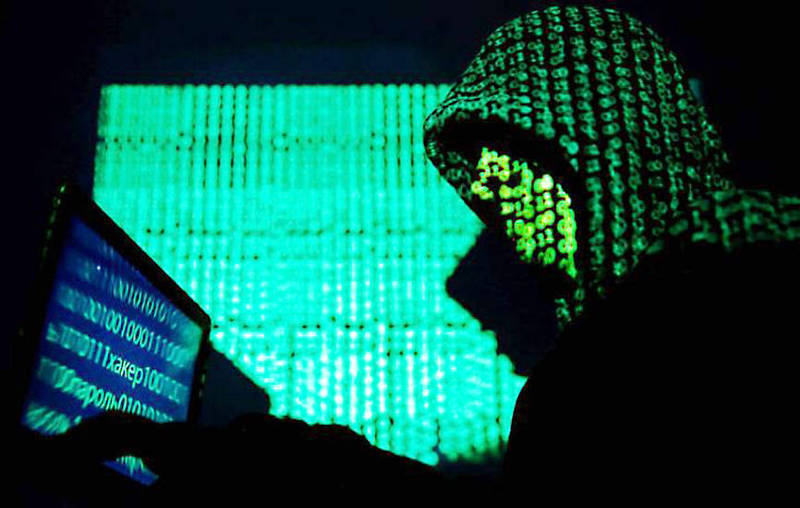《TAIPEI TIMES》 Bureaus to be on disinformation alert

A man types on a laptop as computer code is projected on him in an illustration photograph taken on May 13, 2017. Photo: Reuters
BE AWARE: Prosecutors are already probing two disinformation cases, one involving the use of artificial intelligence to mimic TPP presidential candidate Ko Wen-je’s voice
By Chien Li-chung / Staff reporter
Political disinformation is expected to increase significantly seven to three days before the Jan. 13 elections, so monitoring and investigations would be conducted 24 hours a day, prosecutors said yesterday.
The monitoring and investigations would be conducted by the Ministry of Justice’s Investigation Bureau and the National Police Agency’s Criminal Investigation Bureau, they said, adding that those involved in election interference would be promptly dealt with according to the Anti-Infiltration Act (反滲透法).
Prosecutors said political disinformation can easily mislead people, and if false information is being spread ahead of the vote, it would seriously affect the fairness of the elections.
Some of the disinformation spreading at the moment was circulating a few years ago, but has been re-edited and shared again on social media, prosecutors said, adding that it could have been posted by hostile foreign forces to “test the waters” and see how law enforcement authorities react.
To prevent hostile foreign forces from spreading disinformation that would interfere in the elections, the Investigation Bureau and the Criminal Investigation Bureau plan to launch an around-the-clock monitoring mechanism to detect election-related disinformation online in the last few days before the elections, they said.
If election-related disinformation is detected, it would immediately be investigated and reported to the prosecutors’ office. Cases related to the legislative elections would be handled by local prosecutors’ offices, while those related to the presidential election would be handled by the Taipei District Prosecutors’ Office, they said.
The Taipei District Prosecutors’ Office is investigating two cases at the moment: one involves a list of names posted on social media claiming that thousands of Taiwanese have been wiretapped by intelligence agencies.
The other case involves an audio file that claimed to be a recording of Taiwan People’s Party (TPP) Chairman and presidential candidate Ko Wen-je (柯文哲) revealing secrets about Democratic Progressive Party (DPP) presidential candidate Vice President William Lai’s (賴清德) last visit to the US, prosecutors said.
The two cases used different methods to present the false information, but are both aimed at creating confusion by passing off the false information as genuine, they said.
Regarding the wiretapping claim, a prosecutor said their investigation suggests it came from a foreign source using a virtual private network to hide their location.
The Investigation Bureau’s Anti-Money Laundering Division and the Criminal Investigation Bureau’s Technological Crime Prevention Center are looking into cryptocurrency and other suspicious money flows to clarify whether there are local collaborators assisting those involved, they added.
As for the “Ko” case, some local media outlets on Aug. 16 received an e-mail with an audio file, claiming to be from an internal meeting. In the recording a man who sounded like Ko said that people were offered NT$800 (US$25.50) to attend events during Lai’s visit to the US, as well as other false information.
Ko’s campaign office reported it to the Investigation Bureau’s Taipei City Field Office.
The office used Reality Defender’s platform to examine the audio file and found that it was generated using artificial intelligence (AI), the prosecutor said.
The source is still being tracked, and the possibility of it being from an “external force” has not been ruled out, they said.
Taipei District Chief Prosecutor Cheng Ming-chien (鄭銘謙) said that the elections are facing serious challenges due to rapidly spreading disinformation and foreign interference, and as identifying disinformation is becoming more difficult due to AI, people should not casually share controversial messages.
The Supreme Prosecutors’ Office urged people to report suspected election interference, adding that the highest reward can be up to NT$20 million.
新聞來源:TAIPEI TIMES



















